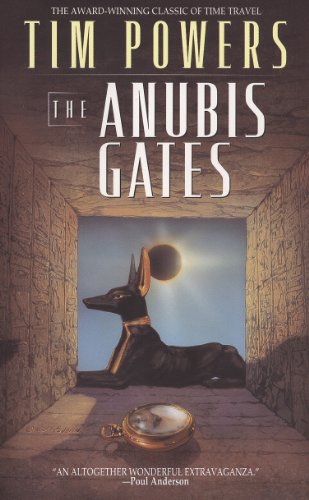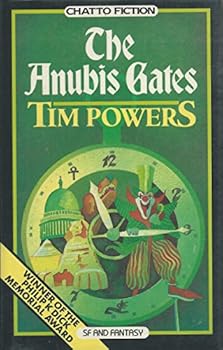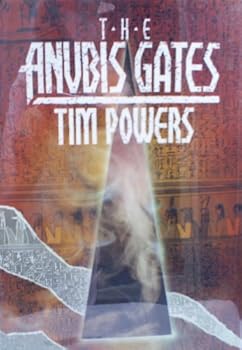
![]() The Anubis Gates by Tim Powers
The Anubis Gates by Tim Powers
Tim Powers’ fourth novel, 1983’s The Anubis Gates, is a book that I had been meaning to read for years. Chosen for inclusion in both David Pringle’s Modern Fantasy: The Hundred Best Novels and Jones & Newman’s Horror: 100 Best Books, as well as the recipient of the Philip K. Dick Memorial Award in 1984, the book came with plenty of good word of mouth, to say the least. And, as it turns out, all the ballyhoo back when was fully justified, as this really IS some kind of superb work. As John Clute puts it in the Jones & Newman volume, it is “a book which it is possible (rare praise) to love”; as Pringle writes, it is a “virtuoso performance.” I could not agree more.
In the novel, we meet a middle-aged widower named Brendan Doyle, an expert on Samuel Taylor Coleridge and the (fictional) poet William Ashbless. Doyle is asked by an eccentric millionaire who has come up with a time travel device to journey back to London in the year 1810, to attend a Coleridge lecture with a group of wealthy chrono tourists. Doyle warily agrees and — to make things brief — gets marooned in the past, where he soon becomes enmeshed in the machinations of Egyptian wizards attempting to destroy England. Powers’ way-out plot somehow manages to conflate the brainwashed “ka” of Lord Byron, a body-hopping werewolf, an underground criminal society headed by a deformed clown on stilts, a plucky young vengeance-seeking woman disguised as a man, Egyptian gods, 4″ high “Spoonsize Boys,” fire and wind elementals, the Mameluke slaughter of 1811, a menagerie of freaks, the Beatles (!) and on and on.
And just when the reader thinks this plot could not possibly get any wilder, Powers catapults Doyle back even further, to the year 1684! Indeed, there is no way for anyone to possibly guess what is coming next, in this truly zany romp of a book. Remarkably, every single page of this nearly 400-page affair boasts some startling conversation, plot twist, description or speculation. Powers has done a huge amount of historical research, and his book always has the ring of verisimilitude, despite the outrageousness of the plot.
 An originator not only of the so-called “steampunk” literary genre but also of the “secret histories” style of writing, Powers, in this book, puts forth his amusing explanations for London’s Great Fire of 1666, as well as Byron’s apparently simultaneous presences in Greece and London in the autumn of 1810. And although stories with time travel paradoxes can sometimes leave me with a headache, I found this one absolutely delightful. Let me not mince words: The Anubis Gates is a blast, from its opening scene in a London gypsy camp in 1802 to its wonderful, ironic, totally satisfying conclusion in the swamps of Woolwich. Clute was right; I really DO love this book, and indeed am in awe of it. So many wild elements mixed together, such an original and imaginative story line, and the whole thing coming together so completely and perfectly…Tim Powers must be some kind of a freakin’ genius! I’m gonna need more of this guy; possibly his 1979 novel The Drawing of the Dark, which is highly praised in Cawthorn & Moorcock’s Fantasy: The 100 Best Books….
An originator not only of the so-called “steampunk” literary genre but also of the “secret histories” style of writing, Powers, in this book, puts forth his amusing explanations for London’s Great Fire of 1666, as well as Byron’s apparently simultaneous presences in Greece and London in the autumn of 1810. And although stories with time travel paradoxes can sometimes leave me with a headache, I found this one absolutely delightful. Let me not mince words: The Anubis Gates is a blast, from its opening scene in a London gypsy camp in 1802 to its wonderful, ironic, totally satisfying conclusion in the swamps of Woolwich. Clute was right; I really DO love this book, and indeed am in awe of it. So many wild elements mixed together, such an original and imaginative story line, and the whole thing coming together so completely and perfectly…Tim Powers must be some kind of a freakin’ genius! I’m gonna need more of this guy; possibly his 1979 novel The Drawing of the Dark, which is highly praised in Cawthorn & Moorcock’s Fantasy: The 100 Best Books….
I would like to add that The Anubis Gates is not an easy read for folks who (like me) choose to look up every historical reference or place name that they encounter. I found a London street map invaluable while reading this book, for example; it’s not necessary, of course, but sure does make for a richer, deeper experience. Thus, I was able to spot one of two flubs that Powers is guilty of in his otherwise perfect work. At one point, he tells us that Coleman Street is east of Bishopsgate Street, whereas a quick look at the map will clearly show that it is west. Powers’ other goof? When he infers on page 353 that Doyle would be attending a literary meeting at the home of renowned publisher John Murray on a Tuesday, and two pages later says it would be on a Monday. (I also find it hard to believe that the word “savvy” was being used in 1684.) Mere quibbles, of course.
For all lovers of science fiction, fantasy, horror, historical fiction and/or poetry, The Anubis Gates should prove a godsend. It is a very generous book, far more intelligent and humorous than it absolutely needs to be, and well deserving of all the accolades that it has recei ved. Oh…and I just love the inclusion of that pig Latin!
![]() I’m going against the grain. I am in the mood for some healthy but hearty dissent. When a book has won awards and been included in top 100 lists, it takes a certain amount of confidence to give it two stars, especially when to do so means disagreeing with one of my esteemed colleagues. That said, here I go.
I’m going against the grain. I am in the mood for some healthy but hearty dissent. When a book has won awards and been included in top 100 lists, it takes a certain amount of confidence to give it two stars, especially when to do so means disagreeing with one of my esteemed colleagues. That said, here I go.
In some ways I agree with Sandy’s review. The plot of The Anubis Gates is certainly outrageous, jam-packed as it is with themes and characters (to the point of ridiculousness). And Tim Powers has, as Sandy says, done a great deal of research to give his time travel tale the ring of truth. But for me this was not always to the good. Several passages smacked of an author determined to drop in all the things he knows, regardless of whether it drives the story.
At one point Powers helpfully informs us that ‘[he] hurried forward but had misjudged the velocity of a Chaplin Company coach and went down under the hooves.’ I too have done my research, and I now know that Chaplin & Co were indeed a real coach company. The thing is — I don’t really care. I certainly don’t want to have to research my way through a fictional book (and I am a history enthusiast). I want to be transported to 1810 England and hear its sounds and smell its smells. The random historical pointers were jarring. When the protagonist, Doyle, ends up in Egypt, I could not escape the feeling that the whole debacle had been formulated to allow for sentences like this:
The British effendis turned their palm-branch chairs around on the side-walk in front of the Zawiyah Cafe to keep an uneasy eye on the procession as they took somewhat deeper sips of their drinks, for this was a formal procession of the Mameluke Beys in all their finery.
This leads me on to another bugbear. I frequently came across descriptive sentences in The Anubis Gates that made me so cross I experienced a perverse enjoyment in turning down the corners of particularly irksome pages. There’s no denying that Powers crams an impressive number of metaphors into his narrative. But surely the point of a metaphor or simile is to help conjure the essence of a place, to bring its sights and sounds to life in the mind’s eye. Powers’ metaphors didn’t work for me.
For example:
He could feel a chilly pressure expanding deep within him, and he knew that when it nosed like a surfacing submarine up into his consciousness it would be recognizable as panic…
Why not just say he was panicking?
…[he] gasped in dismay when the little figure marched several inches down his painted path… making a sound like a clock clearing its throat.
I love a surprising, evocative simile, but for the life of me I cannot summon a guess at what a clock clearing its throat sounds like. Perplexing.
Doyle’s legs were distant columns of numbness, only recognizable as his own when they were occasionally lanced with tooth-grinding agony, and his spine felt like a big old dried sunflower stalk that kids had used for a blowgun dart target.
Battling through these convoluted snippets of detail proved exhausting (although battle I did in order to bring you my words of wisdom).
I am willing to admit that The Anubis Gates is a remarkably impressive weaving of ideas and it packs a pacey plot. What’s more, some of the magical creatures truly caught my imagination. I loved the little Spoonsize Boys and the raging fires with minds of their own. But aside from those titbits the vast array of characters were flat and mostly unlikeable. The inclusion of Samuel Coleridge and Lord Byron felt unnatural. It seemed as if Powers had set out to weave the poets in from the very start, and when it didn’t really work proceeded to shoehorn them in with all the subtlety of a smack in the face.
To give you a Powers-esque conclusion, The Anubis Gates was like one of those dishes at a fancy restaurant that should be good, but there are too many mousses, foams and fondant potatoes on the plate and you wish you’d stuck with a burger. And for that terrible finale, please forgive me.
~Katie Burton

![]() The Anubis Gates was one of my favorite books back in high school, a madcap time-travel adventure, a maniacal blend of steampunk, Dickensian London, Egyptian sorcerers, villainous rival beggar gangs, real poets Samuel Taylor Coleridge & Lord Byron, fictitious Victorian poet William Ashbless, monstrous human/animal experiments lurking in the sewers below London, a body-switching werewolf, hairy ape-men running mad with bleeding mouths, spoon-sized boys, and a modern-day scholar of Victorian poetry who travels back with a group of time-traveling sightseers and gets stranded. Tim Powers throws in so many disparate plot elements, grotesque villains, and non-stop action that it’s all a bit overwhelming, but it was an incredibly fun ride.
The Anubis Gates was one of my favorite books back in high school, a madcap time-travel adventure, a maniacal blend of steampunk, Dickensian London, Egyptian sorcerers, villainous rival beggar gangs, real poets Samuel Taylor Coleridge & Lord Byron, fictitious Victorian poet William Ashbless, monstrous human/animal experiments lurking in the sewers below London, a body-switching werewolf, hairy ape-men running mad with bleeding mouths, spoon-sized boys, and a modern-day scholar of Victorian poetry who travels back with a group of time-traveling sightseers and gets stranded. Tim Powers throws in so many disparate plot elements, grotesque villains, and non-stop action that it’s all a bit overwhelming, but it was an incredibly fun ride.
Thirty years later, I decided it was time to revisit one of my favorite SF/fantasy/horror mashups. This time I listened to the audiobook narrated by Bronson Pinchot, also known as Balki from the inane sitcom Perfect Strangers back in the 1980s. He has become a well-respected voice actor and sounds nothing like that silly character. He manages to do a huge range of accents, mostly Victorian British, and the wealth of historical details of Victorian London that Powers packs into such an action-filled story is quite an impressive achievement. Hearing so many familiar place names in London was a great pleasure.
Of course I didn’t feel quite the same youthful excitement as I did three decades ago, but that is a direct result of the Heraclitus quote that starts out the book and provides a perfect metaphor for time:
No man ever steps in the same river twice, for it’s not the same river and he’s not the same man.
I’ve remembered this quote over all the intervening years, and it is completely true. Just substitute the word “book” for “river,” and it aptly describes the experience of revisiting an old favorite. The Anubis Gates remains the whirlwind time-travel/steampunk/Victorian/horror adventure I read before and is still just as enjoyable, but I am not the same teenager anymore and I was able to enjoy it differently as an adult. Sometimes I wish I could go back to that time when every book I read was a completely immersive experience, but the next best thing is to step into the river again and see what it feels like.
~Stuart Starosta






I would argue with you about “savvy”… maybe. It’s a corruption of “sabe” in Spanish. Used at the end of statement, it means, “Do you know?” (Actually, just the way Johnny Depp used it in those Pirates movies.) So it could have been around. I can’t sound very authoritative, though, because I don’t know the context here.
I’ve only read a couple of Powers’s books, but you make this one sound fantastic, and it’s going on my list right now! Thanks for the excellent review.
Hope you both enjoy this book as much as I did, ladies. And thanx for the kind words, Marion….
Oh…and according to Webster’s, the word “savvy” was first used circa 1785…a full century before the time that it was used in Powers’ book. Oopsy!
Then I have to agree — that’s a blooper!
This is probably my favourite Powers book. I’ve read it at least three times and it gets better all the time. Otherwise, early Powers is best — I felt he lost his way at some point. I think Last Call or Earthquake Weather was the most recent I read. Definitely worthwhile are The Stress of Her Regard (Keats and the Romantics in deep doo-doo) and On Stranger Tides (Pirates of the …) Enjoy!
I really like *The Stress of her Regard* and if *Last Call* is the ghost one, then I liked it too. Haven’t read much of his lately.
Thanks for the review, Sandy. I’ve downloaded it. And Tizz, thanks for the recommendations! I’ll follow up with those titles if I like this novel.
This was definitely a wild and crazy ride that has a little bit of everything but somehow manages to stay together. It’s one of my favorite novels from the 1980s, but somehow I haven’t read anything else by Powers, though I’ve heard good things about On Stranger Tides, The Stress of Her Regard, Last Call, etc.
This and On Stranger Tides are the only two Powers books I’ve actually enjoyed. All of his others are way too grim for me.
I generally don’t have problems with word choices like ‘savvy’ in my mind whether it is actually correct isn’t as important is whether it gives the atmosphere needed for the story. This also holds true for me with dropped in foreign words and dialogue. This helps give the characters and story background and tone. Just like Johnny Depp’s Jack Sparrow wouldn’t be the same without the drunken wobbling – whether it is an accurate depiction of a lifelong pirate’s body language or not. It depicts something we can only get via that exaggerated mannerism.
And since I read 600-800 page books on a regular basis, I tend to not realize when an author is having fun with descriptions. If the characters and plot are strong enough, extraneous descriptions aren’t noticeable to me.
Katie, I couldn’t even finish this book, for exactly the reasons you listed!
Phew, glad I’m not the only one!
Katie, I’m siding with Sandy and all the other fans of this book. It’s one of my favorites from my teenage years, as I remember it being an incredible, free-wheeling, and madcap exotic adventure. Granted that was two decades ago, so I’d like to revisit it again with a more ‘mature’ perspective. Problem is, this is one of the only Tim Powers books that is NOT available in audio format, which I can’t fathom. In any case, book taste certainly varies, and it clearly didn’t work for you.
This book made no sense to me at all. I was hoping for some explanations at the end but it left me wondering what in the world I just read. I agree with Katie’s review. I give it a generous (Merry Christmas!) 2 stars.